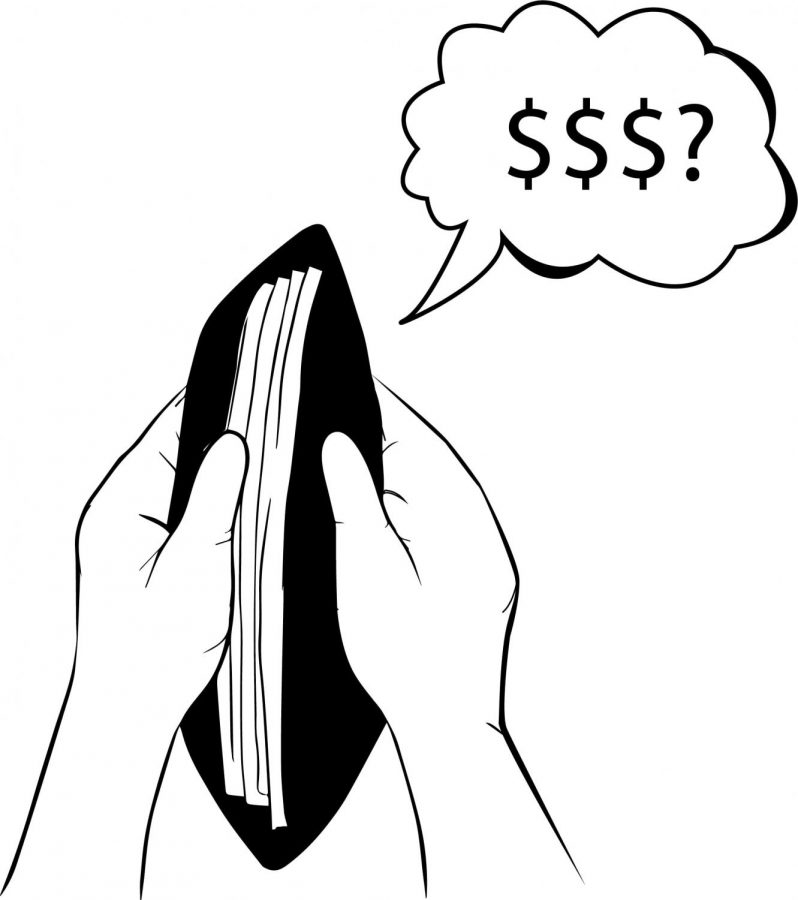Overspend until your money runs out. Or don’t.
January 13, 2021
Is your wallet empty? Is your savings account dry? Well you aren’t alone. For many students, overspending their money is a bad habit that is not easily broken.
No need to fear. There are some options to help keep your wallet full and your savings account intact.
Realize why you might be overspending
Stress – Buying items for yourself as a way to deal with the stress in your life.
Shopping addiction – Having an uncontrollable desire to buy everything you set your eyes on.
Lack of a budget – Not having a set amount of money to spend each month on necessary things and failing to have a spending limit on unnecessary things like ice cream, new wallet, etc.
Reward mentality – Buying something every time you complete an assignment or goal (no matter how small).
FOMO – Fear of missing out; Buying to fit in or stay in the loop with others.
Use an automatic savings deposit
Shawndra Thielen, a senior English education major, feels that she not only has to be able to set an example for her future classroom full of kids, but also for herself. Being smart with her money is something that she still struggles with today.
“I find myself spending a lot of money when I am bored or stressed, but other times I will randomly be scrolling through social media and something will catch my eye,” she said. “I’ll immediately click on the link and either buy the item then and there or put it on one of my wish lists.”
Knowing when it is okay to buy a new couch or splurge on a cute pair of shoes and knowing when to save money is a skill that has to be learned. Being able to control the impulse to not give into the advertisements on social media is one thing Thielen blames when it comes to overspending.
Impulse buying has most likely increased due to the pandemic this year, but a study from November 2018 on Statista showed that nearly 87% of individuals ages 18-24 impulse bought items from a store and regretted it later on.
Look to the future
After Thielen realized what was causing her spending habits to go crazy, she decided to start automatically depositing some of her check from her job into her savings account. Having it automatically deposited helped her save some money for the future.
“Thinking about the future and what I will need money for in the long run is what has helped me with preventing overspending a lot this year, and I think that is what I would recommend to other students struggling as well,” she said. “Look into the future and be conscious of where and when you spend your money.”
Make a grocery list
This may seem like an obvious tactic, but it can be too easy to go to the grocery store only shopping for yourself and end up with a receipt over 100 dollars.
Sydney Wood, a senior journalism major, can relate to overspending at the grocery store.
“I consider myself a chronic over-spender. I am aware of it, so I find it easy to keep myself in check when I really need to,” Wood said. “I am notorious for overbuying at the grocery store since it’s tough shopping for one while in college, so I have taken to creating detailed lists beforehand and sticking to that while shopping.”
Cutting back on organic items that are usually pricier can help with keeping a grocery shopping bill low as well, but food prepping is another tactic that might help with overspending in the long run.
Meal prep
One of the main ways Jerrod Fedorchik, a senior biochemistry major, prevents overspending is through controlling his diet. While cooking at home, Fedorchik meal preps every week.
“Meal prepping has been one of the most efficient and intelligent choices I have made since coming to college,” he said. “Planning out my meals every week has significantly reduced my bill, and it has helped me budget for food accurately.”
Most of all…
No matter what you overspend your money on, whether that be food, clothes, a new pet or alcohol, it is important to realize how crucial it is to resist the call to spend your money on a new item you don’t need or can’t afford in the long run.
This coming year, try and reflect on how you can help your wallet and your bank account in your own ways.
























